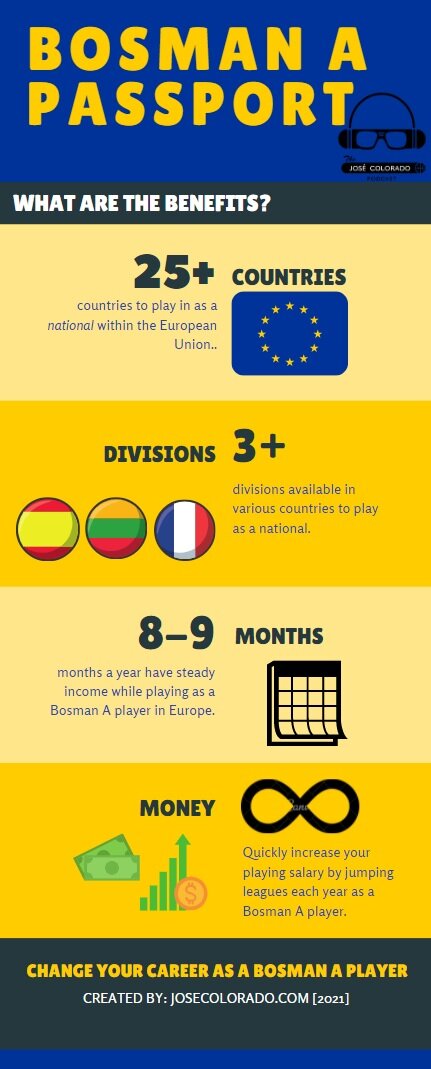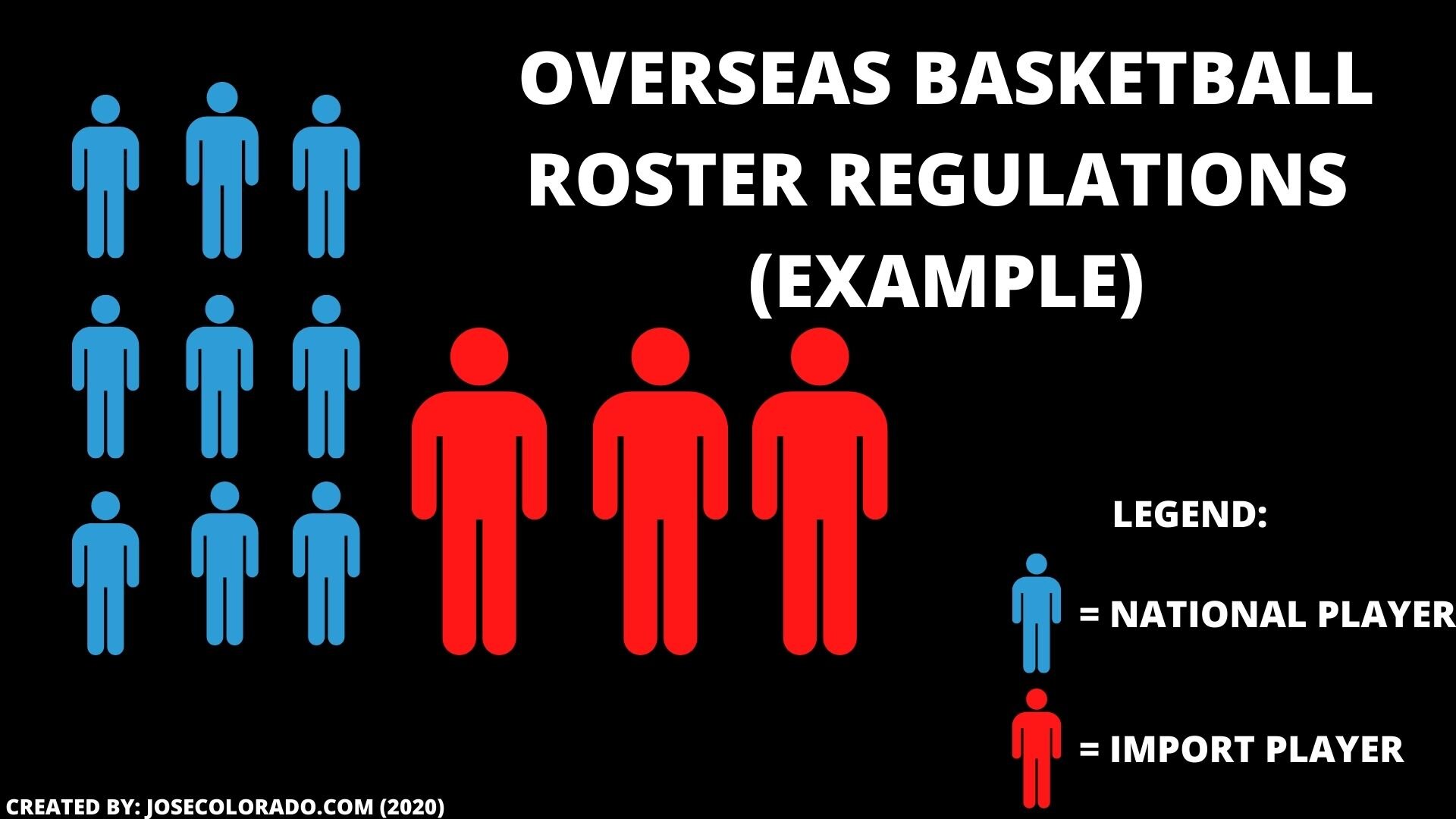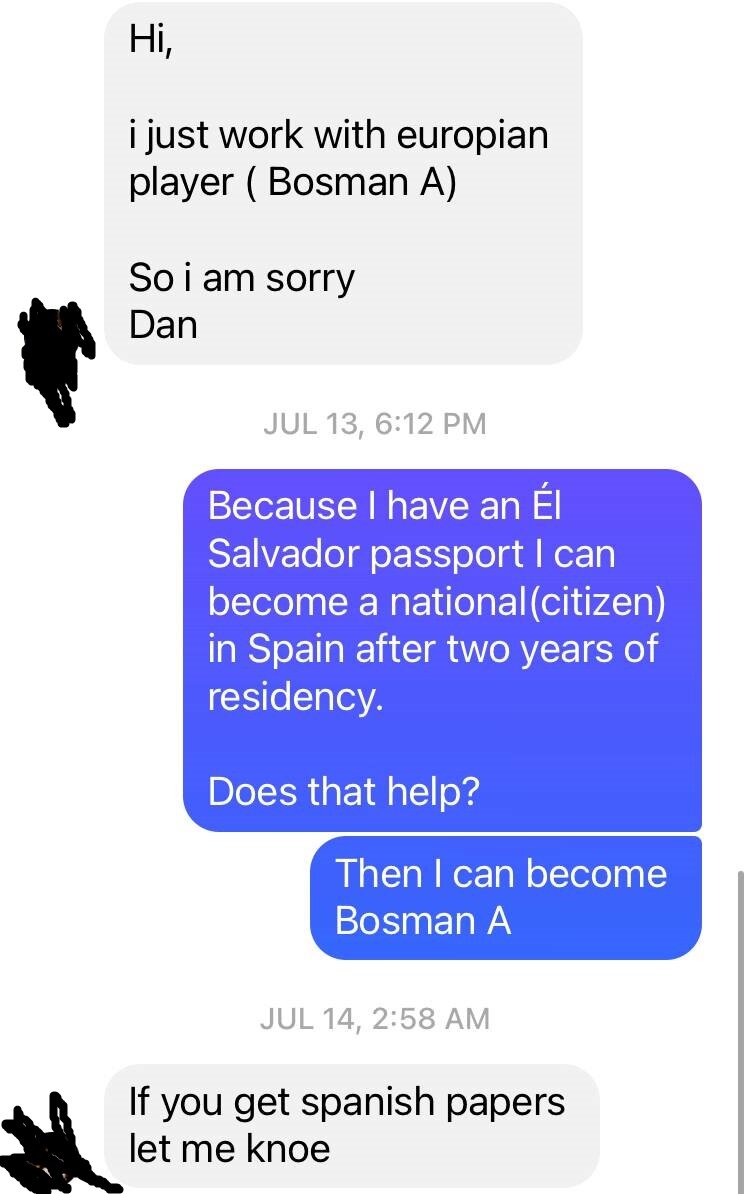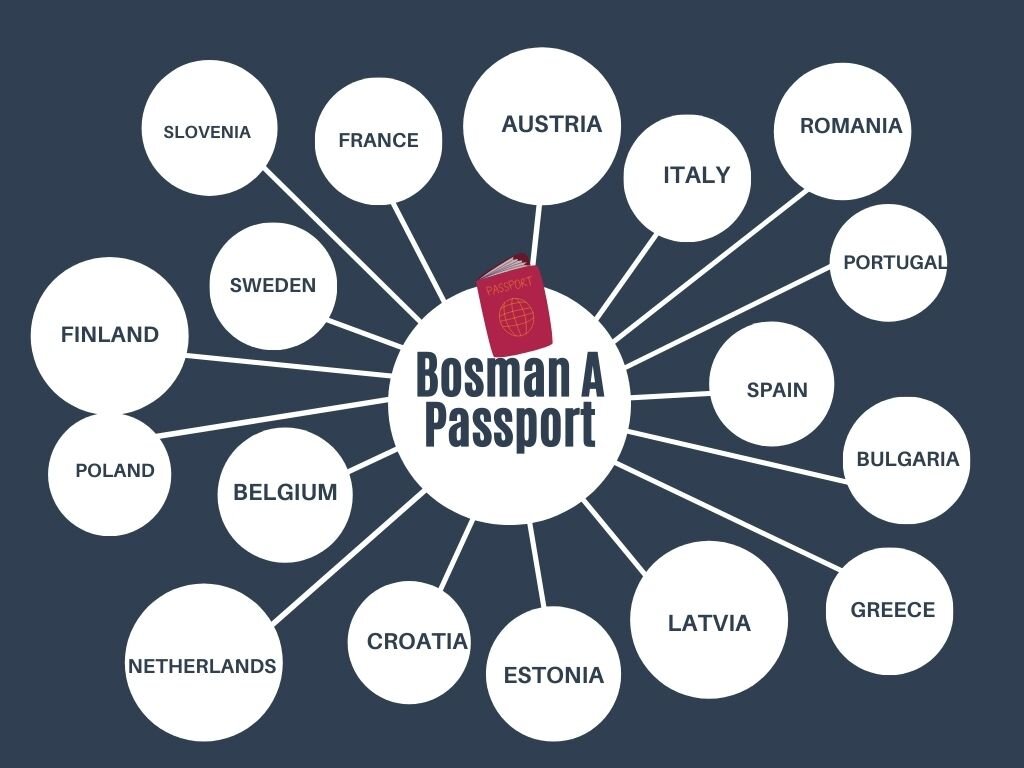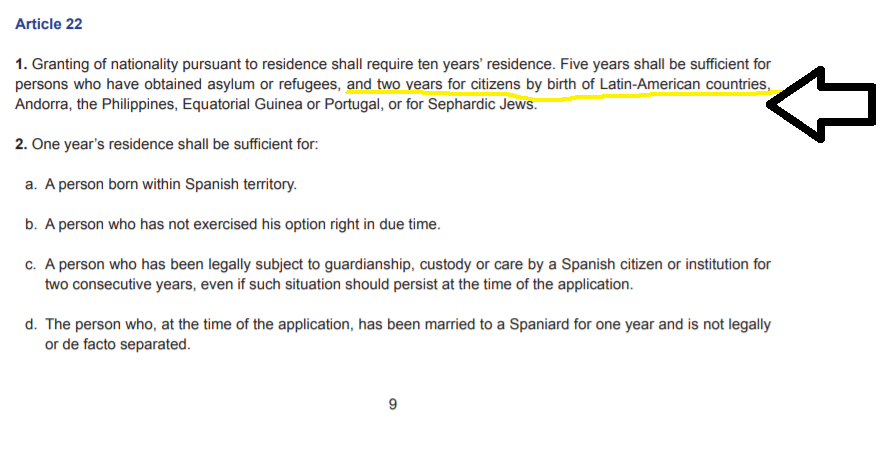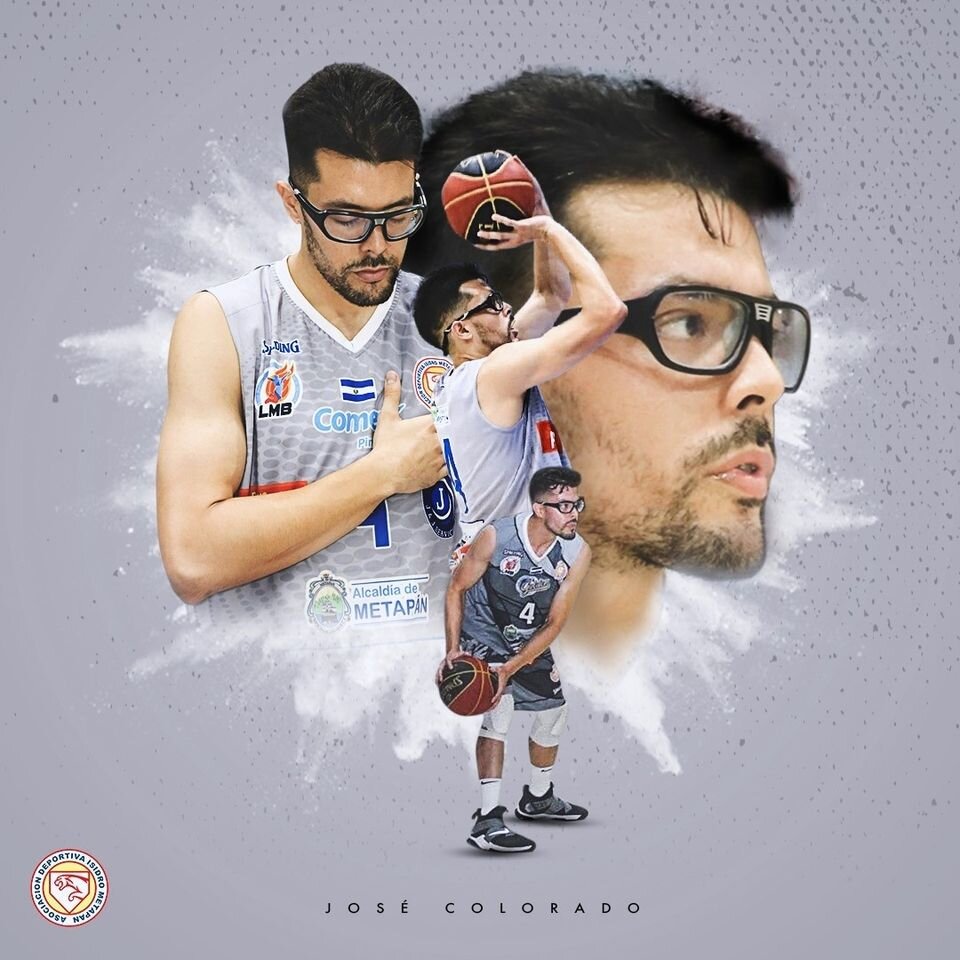What is the Bosman A Passport in Basketball? [Definition + List of Updated Eligible Countries]
Attention basketball players of European descent:
You may have the single greatest asset in overseas basketball - the Bosman A passport.
Now:
For the time being, I’ll assume you have GAME so that won’t be a problem.
If that’s the case:
Then read on because the issue then becomes understanding the accessibility, requirements and power of the Bosman A passport.
It may just be your ticket to convincing overseas pro teams to take you on.
So let’s understand why.
What is a bosman a passport?
The Bosman A passport simply refers to any professional athlete who holds a European Union passport. Instead of being called a European Union passport, the name takes after a Belgium soccer player named Jean-Marc Bosman who won a historic court case in 1995, ensuring the free mobility of professional athletes across all sports in the European Union.
Previously, pro teams could restrict player movement (i.e. signing with another club) even after players had finished their current contract.
Not after the Bosman ruling.
In case you were wondering more about its origins, here’s a great video explaining its history.
what does a bosman a player mean in basketball?
The Bosman A passport grants overseas basketball players an immense amount of mobility and advantages as professionals since they can play as a “domestic player” within MANY European Union pro leagues without counting against the foreigner “import” quota.
This makes Bosman A players exponentially more valuable to agents, coaches and managers across Europe since talented nationals are always in high-demand.
If you don’t hold a Bosman A passport (i.e. European Union passport) then you would have to play as an “import” or “foreigner (foreign-born player).”
An import or foreigner simply refers to any player WHO DOES NOT hold citizenship/passport within the country they are playing in.
An example - when thinking specifically of Europe - would be:
Americans
Canadians
Japanese
Chinese
…literally any player who does not hold a European Union passport.
Roster spots for import players are limited.
Sometimes it’s 1 per team.
Other times, it’s 2 or 3 or 4.
It depends on the country and league.
But:
With a Bosman A passport you don’t have to worry about that because you count as a national (some exceptions - more on this later).
It gets much better though:
WITH THE BOSMAN A PASSPORT, YOU NOT ONLY COUNT AS A NATIONAL IN YOUR COUNTRY OF ORIGIN BUT ALSO IN MANY OF THE EUROPEAN UNION COUNTRIES.
For instance:
A Croatian would not only count as a national when playing in Croatia.
But he/she would also count as a national when playing in Spain, Romania, Poland…and any country within the European union.
The same goes for a Spaniard wanting to play in Croatia, Italy (1st division) etc.
There are SOME exceptions and the rules can vary depending on the country.
For example:
In Germany’s top division - the BBL - there is no distinction between Bosman A and foreigner.
The league simply wants 6 Germans and 6 non-Germans - whether they are American/Canadian/Chinese or a Bosman A player is irrelevant.
But for now:
Just know that, in general, Bosman A players count as a national in many EU countries.
This is a very important distinction because:
THE MAJORITY OF ALL EUROPEAN OVERSEAS BASKETBALL ROSTERS WILL BE MADE UP OF NATIONALS, MEANING POTENTIALLY BOSMAN A PLAYERS.
That means as a Bosman A player, you’ll have:
Greatly increased likelihood of securing a consistent job (more roster spots)
20+ countries with available national jobs for you waiting
Available national jobs in each division in each EU country (not limited to just D1)
Less pressure/expectations to perform as a Bosman A (not an import)
More security (nationals always in demand)
So let’s think of a clear example:
In Spain’s 4th Division - EBA, imports (Americans usually) are battling it out for 1 roster spot since this league allows 1 foreigner per club.
Whereas, Bosman A players have more than a handful of roster spots available to them (assuming it’s a 12-man roster) - much less competitive.
Please understand something:
This is extremely rare.
In most countries you will only count as a national in the country you get your citizenship in.
For instance:
As a Canadian citizen, I only count as a national in Canada.
My “national status” doesn’t extend to the USA, England, Australia - or anywhere else.
I get an advantage as a national in one country - and that is, Canada.
This is why the Bosman A passport is truly so remarkable.
It literally opens up the doors to hundreds of jobs from tens of countries.
From there you can prove yourself and move up the ladder.
what is a bosman a player’s salary?
Bosman A overseas basketball players are also at a distinct advantage over foreigners when it comes to salaries/wages since nationals are more easily able to make the jump to higher divisions due to the increased roster spots.
That means, maybe strictly as an import the highest level you could reach was Division 3 since:
Imports have higher expectations (i.e. you need better stats)
The imports in the higher divisions simply outmatch you (i.e. better resume)
Clubs in higher divisions have different needs (e.g. maybe they only want a BIG import and you’re a guard)
…etc.
BUT:
As a national, a D3-level import can EASILY become a D2 player and then likely a D1 (depending on country).
That means if you are able to obtain your Bosman A passport then you move up the ladder in competition and with that - your pay grade.
And agents know this.
That’s why certain agents will only work with Bosman A players.
Just look at some of the interactions I’ve had with agents in the past when discussing the possibility of me getting my EU passport (more on this later).
Remember:
So it may be tougher going as a low-league import rather than a high-league national.
WHAT ARE A BOSMAN A PLAYER’S EXPECTATIONS IN OVERSEAS BASKETBALL?
As a foreigner you’re expected to lead and kill.
As a national you’re expected to follow and blend in.
Now:
European basketball as a whole is much more developed and team-oriented than likely all other parts of the world outside North America.
So the expectations on imports in Europe aren’t as unrealistic as I’ve written about elsewhere where they quite literally will send you home after a single bad game.
But even so:
You will be expected to kill as a foreigner.
That’s not usually the case as a national (outside of the top levels).
Instead you can:
Settle into your role
Provide a spark in whatever it is that YOU do (e.g. rebounds, spot-up shooter)
Get paid well for doing so
Less stress, more money - sounds pretty good to me.
bosman a countries in basketball
Bosman A countries in overseas basketball are all the EU countries. Some of the most competitive and well-paying countries in European basketball are Bosman A countries including Spain, Italy, France, Greece and Germany.
Above you can see some of the key countries where you can freely travel and play as a national with the Bosman A passport.
There are a few more but for the purposes of the image, I didn’t want to cram them all together.
Here is the complete list as of 2021 for Bosman A countries.
|
BOSMAN A COUNTRIES |
|||
|
ANDORRA |
AUSTRIA |
BELGIUM |
BULGARIA |
|
CROATIA |
CYPRUS |
CZECH REP. |
DENMARK |
|
ESTONIA |
FINLAND |
FRANCE |
GERMANY |
|
GREECE |
HOLLAND |
HUNGARY |
ICELAND |
|
IRELAND |
ITALY |
KOSOVO |
LATVIA |
|
LITHUANIA |
LUXEMBOURG |
MALTA |
NORWAY |
|
POLAND |
PORTUGAL |
ROMANIA |
SLOVAK REP. |
|
SLOVENIA |
SPAIN |
SWEDEN |
|
how do i get a bosman a passport?
To become a Bosman A passport holder, a player must explore his/her family lineage and find some form of family connection to a European Union country - whether that is through a bloodline (i.e. parents are from a EU country) or being born in a EU country (restrictions apply).
If he/she fulfills that specific country’s requirements then they will be granted citizenship within that country - ensuring his/her rights to being classified as a Bosman A player in overseas basketball.
The technical terms in case you want to research more:
Citizenship by bloodline = jus sanguinis
Citizenship by birth = just soli
I got into greater depth about each here so take a look if you’re interested.
When it comes to obtaining citizenship by bloodline, meaning through ethnicity or nationality, the requirements will vary.
Some European countries allow for the bloodline to be dated back to your great-grandparents including: Germany and Italy
Others cut it off at your grand-parents or even just your parents.
In my personal case:
I tried to get my UK passport through my mom’s side as my great-grandmother was Scottish.
Unfortunately:
The UK cuts off the bloodline requirement at grandparents so it was a no-go since my grandmom/dad weren’t Scottish - they were Canadian.
Again:
This will all depend on the country so you have to do your research.
Don’t know where to get started?
Visit your local embassy for the country you are seeking citizenship in
Google: [Country] + nationality law
Google the country’s official government website on nationality
Gather info by asking your parents, grandparents and great-grandparents (if they’re still alive) about their family history (what nationalities did they hold? Where were they born? etc.)
At this point - breathe.
This process will take A LOT of effort and TIME and can be very:
Tedious
Complicated
Frustrating
Boring
But think of the potential payback.
This will completely change your career - or literally give you a career as it did for me in El Salvador - so it is something you have to explore to the fullest if you are SERIOUS about your overseas basketball career.
No exceptions.
One final point:
There are some loop holes to get citizenship if you don’t have European heritage.
For instance:
Recently I discovered that Latin American descendants are eligible to be naturalized after 2 years of legal residency in Spain.
That would be one way to get a Bosman A passport if you have Latino blood but have no European connection.
Photo credit: Spanish Civil Code
These type of loopholes exist in other countries as well.
You just have to do your research.
Other ways to get citizenship:
Marriage
Investment program (invest in the country in exchange for a passport)
Government special exemption (special order from the gov’t)
Regardless of however it is you want to try and get your Bosman A passport, remember:
Visit the embassy immediately (in-person always if you can)
Get the process started immediately (this will take a LONG time)
Get all of your documents ready ASAP (birth certificate, passport, your dad’s/mom’s birth certificate)
Have patience and a positive attitude
Conclusion:
So there you have it.
The Bosman A passport - maybe the most powerful passport in overseas basketball as it allows overseas players mobility across the entire European Union allowing them to increase:
Playing opportunities
Playing wages
Career longevity
Amazingly:
The advantages of a Bosman passport doesn’t just end here as there is also a very powerful Bosman B passport that pertains to other European countries.
Are you a Bosman A player?
What have your experiences as an overseas basketball player been like with this passport?
Let me know in the comment section below!
Jose Colorado is a five-year professional basketball player helping others achieve their goals of pro basketball through a proven, research-based approach.
READ MORE
